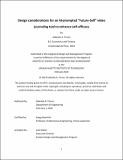Design considerations for an AI-prompted “Future-Self” video journaling tool to enhance self-efficacy
Author(s)
Torres, Gabriela A.
DownloadThesis PDF (3.354Mb)
Advisor
Kim, Sang-Gook
Terms of use
Metadata
Show full item recordAbstract
This study explores a self-management digital solution designed to empower individuals struggling with emotional self-regulation. With a focus on increasing self-efficacy in specific areas or goals, the study proposes an 'AI-prompted future selfie-video journaling tool' to guide users through the process of recording video selfies with future-self narratives. The study aims to gain insights into a Large Language Model (LLM) that should be fine-tuned based on unique experiences, compare different styles of guided approaches, test metrics for self-efficacy and Future self-continuity feedback, and identify pain points for an efficient design. In a 5-day experiment with participants aged 24-77 from the USA and Peru, insights were gained by playing a simulated WhatsApp AI-assistant chatbot role. Participants were guided to set concrete goals and empowering emotions, then followed the process of recording at night and later replayed the video upon waking up the next day, utilizing the 15-minute window of theta brain waves. Those who completed the task reported gains in self-reflection on emotions, leading to more positive thoughts about daily activities. However, the study identified a key challenge: the necessity for personalized adaptation to ensure the LLM's understanding of both general patterns and the intricacies of individual mental health preferences for effective user engagement and education.
Date issued
2024-02Department
System Design and Management Program.Publisher
Massachusetts Institute of Technology